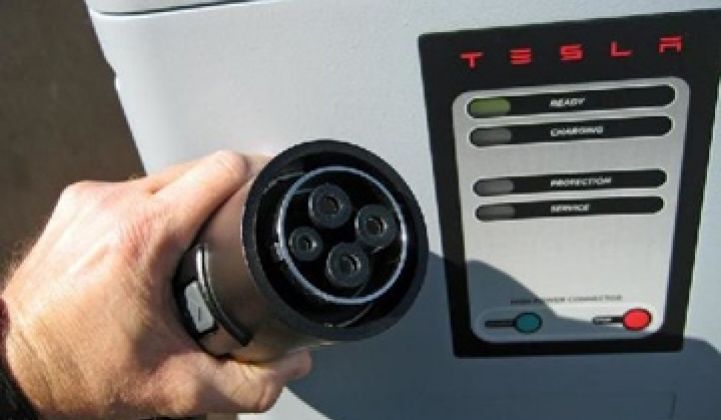Companies like Better Place that want to sell electricity to electric car drivers may have to face off in the future against the one of the most powerful forces in American history.
People giving something away for free.
Free charging for electric cars may become a popular marketing tool for restaurants, garages, stores and other companies looking to draw customers, at least according to early electric car buyers who are mapping out free places to jet a jolt.
"The main place for charging stations is going to be restaurants," said James Morrison, CEO of EV Components, which makes components for electric cars and plug-ins, and an electric vehicle fan.
At this stage, the free concept is embryonic, but so is the electric car industry. Two Indian casinos in the Pacific Northwest are already installing free charging stations, he noted. (No Limit Pai Gow, Joan Jett and a Full Tank!)
A website called EV Charger News maps out available outlets. Some are official charging stations. Some are just plugs that happen to be open to the public. Owners of Tesla Roadsters and other all-electric contribute notes and advice.
"I stopped by the Nut Tree charger, and while EV enjoyed her SPI charge, I enjoyed some real Mexican food at the Via Corona restaurant ... decent mariscos [seafood] in a casual setting," Richard Casias wrote about the charger at the Nut Tree Village.
The charger at the Stoneridge Mall, meanwhile, was out for a while because an electrician cut the wire while modifying a store.
What makes the idea intriguing is the math. Compared to gas, electricity remains a bargain. A kilowatt hour of power costs around 11 cents on average in the U.S. An all-electric into a standard 110-volt, high-speed charger for an hour might only suck down 15 cents of power. The tab might come to $2 to $3 a 240-volt high speed charger but in that hour a car could get enough energy to go 100 miles, according to Morrison.
The restaurant spends a little, but charging generates great PR and maybe some loyal customers. At Best Buy, customers who want to top off their batteries might spend a few extra moments gazing longingly at that 50-in LCD TV with 120 herz refresh rate. A quick hour charge also ameliorates fears about range anxiety and is short enough so consumers won't feel like they are stuck waiting on their car.
"Costco spent less than a $1 of electricity on me, I spent $545 in their store. Why wouldn't every Costco want chargers at all their stores?," wrote Irelands1 about the store in Rohnert Park. Like a lot of places, Costco reserves parking for EV drivers too.
Free power has a precedent. Walmart for years has allowed customers to camp in its parking lots and plug into outlets. The policy has received extensive coverage by magazines and TV stations worldwide.
The infrastructure, moreover, exists. Morrison owns a Tesla Roadster, a Prius modified for plug-in driving, and an all-electric Vectrix scooter and has spent time scouting for open outlets in the Seattle area.
"Every single parking garage has a 110 outlet," he said. "I always ask. No one has ever said no. We are talking cents per kilowatt hour."
Free could benefit or hurt companies trying to get into charging. Coloumb sells charging stations and conceivably could sell them to a store. But if the power is free, a store might balk at the $30,000 price tag for the charging station, forcing the company to adjust pricing in the future.
Better Place, by contrast, has a more difficult time because it hopes to gain its revenue from selling power. Electricity sales are supposed to offset the cost of the car battery. Then again, if electrics gain popularity, the novelty and marketing value could fade as expenses and lines increase. Free also means accepting the charger where you find it.
"Teens running around the upper level cursing and causing havoc. Rumors of a fight with a possible shooting near the food court - definitely did not feel safe!" wrote one user on EV Charger about the Moreno Valley Mall, which has a charger.
Still, even if America understands free, many are still getting used to the idea of electric cars.
"Tesla charger still not working. In addition, beware that on the weekend the only RV park with power hookups that answers their phone is Tradewinds and they will *not* allow electric car charging even for a fee (afraid the car will damage their electrical system). There is an outdoor 120v outlet by library one block from the ferry terminal," wrote one Tesla owner about the charging station at the Vallejo Ferry Terminal.
Oh, and the charger at the Fremont Costco is not working.
Photo of a Tesla charger station courtesy EV Charger News.



